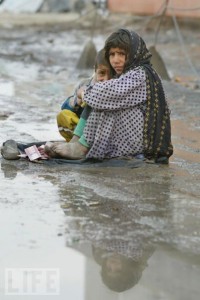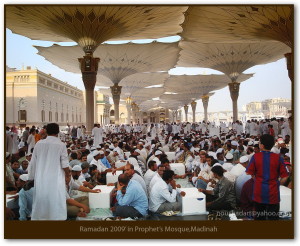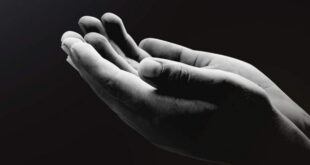‘They have taken away all the rewards’
by Faraz Omar (Editor Saudi Gazette)
 Abu Dharr reported: Some of the people from among the Companions of the Apostle of Allah (may peace be upon him) said to him:
Abu Dharr reported: Some of the people from among the Companions of the Apostle of Allah (may peace be upon him) said to him:
“O, Prophet of Allah! The rich among us have taken away all the rewards,” complained the poor Companions. “They pray as we pray, they fast as we fast, but they also give wealth in charity (sadaqah) (while we have no wealth to spend).”
Upon this he (the Holy Prophet) said: “Has Allah not prescribed for you (a course) by following which you can (also) do sadaqah? In every declaration of the glorification of Allah (i. e. saying Subhan Allah) there is a Sadaqah, and every Takbir (i. e. saying Allah-O-Akbar) is a sadaqah, and every praise of His (saying al-Hamdu Lillah) is a Sadaqah and every declaration that He is One (Laa Ilahah Illallaah) is a sadaqah, and enjoining of good is a sadaqah, and forbidding of that which is evil is a Sadaqah, and in man’s sexual Intercourse (with his wife,) there is a Sadaqah.”
They (the Companions) said: “Messenger of Allah, is there reward for him who satisfies his sexual passion among us?” He said: “Tell me, if he were to devote it to something forbidden, would it not be a sin on his part? Similarly, if he were to devote it to something lawful, he should have a reward.” (Sahih Muslim, Book #5, Hadith #2198)
The poor among the Ummah deserve a special mention because they are more often than not overlooked, their interests disregarded and their voices ignored. Throughout human history, they have always been the first to believe in the Messengers of Allah, and they will enter Jannah 500 years before everyone else.During Ramadan last year, at the initiative of a friend, we stood at a traffic signal giving away dates, water and laban just before Iftar time for commuting people who may not have a chance otherwise to break their fast with food. We distributed all the food packs without realizing we had kept none for ourselves, which left us with no other option than breaking our fast at a masjid nearby. The adhan was called while we were heading to the masjid.We joined the “banquet” of a people who would seldom – if ever – join ours. They were those whose names would never find place in the sprawling invitations we give out for our lavish feasts. Yes, they were all there – the African children and the Asian laborers.Yet they welcomed us with a smile and made space for us. They shared their Iftar, which was no more than some dates, a piece of bread that they broke into half for us, and some drinks. Being used to excess, we couldn’t imagine how the already small meal would be sufficient for them if they divided between us.The African children, stereotyped for crimes and what not, were wonderful. A boy turned to me and passed on his can of soft drink. What should I do? I refused. “Children they are after all, who not just love, but crave for sweet drinks,” I thought. He pushed the can towards me and gestured he would share his friend’s.These are people who we don’t even say our salaams to. The Black women scavengers are seen all around the country. They stop with their trolleys and children at the time of Salah and pray on pavements. Nevertheless, we pass them by as if they don’t exist, as if they are excluded from the obligation of saying salaams to our fellow Muslims.How much did I learn from that incident? I don’t know. Which lesson was the most important – being content with little; giving preference to others over ourselves; or genuine hospitality? I don’t know. I was reminded of a narration in Al–Bukhari [Book #58, Hadith #142]:
A man came to the Prophet (peace be upon him) and said, “Poverty has struck me.”
The Prophet sent a messenger to his wives (to bring something for that man to eat) but they said that they had nothing except water. Then Allah’s Apostle said, “Who will take this (person) or entertain him as a guest?” So an Ansari man came forward to host the man. He took him home and told his wife, “Entertain the guest of Allah’s Messenger generously.” She said, “By Allah! We have nothing except the meal for my children.” He replied, “Put your children to sleep if they ask for supper. Turn off the lamps. We go to bed hungry tonight.” The lights were put off so the guest wouldn’t know the hosts had nothing to eat, but were merely pretending to eat in their empty plates. In the morning the Ansari went to Allah’s Apostle who said, “Tonight Allah laughed or wondered at your action.” Then Allah revealed: “But give them (emigrants) preference over themselves even though they were in need of that And whosoever is saved from the covetousness Such are they who will be successful.” (Surah Al Hashr 59:9)
 Life carried on and the incident was soon buried in the sands of time till something similar took place this Ramadan. This time we were in the Prophet’s Mosque, waiting for the time of Iftar. As is the usual practice, locals of Madinah compete with each other to serve the fasting people. The sufra was spread early, and the people were taking their spots – the places from where they would serve.
Life carried on and the incident was soon buried in the sands of time till something similar took place this Ramadan. This time we were in the Prophet’s Mosque, waiting for the time of Iftar. As is the usual practice, locals of Madinah compete with each other to serve the fasting people. The sufra was spread early, and the people were taking their spots – the places from where they would serve.
The hosts of the sufra where I was seated were a father and four sons, the eldest of whom looked no more than twelve. As yoghurt, bread, dates and water were being dished out, one of the boys would stand by the passageway inviting the influx of worshipers to break the fast at his sufra. He had many competitors to worry about. When people walked past him without paying any attention, he started to cling on to their arms with his tiny hands, pleading them to be his guests.
What desire to serve! How could any number of words describe that sight, or describe the emotions that would erupt from such a sight?
My hosts did not appear rich. Their clothes were simple. The father’s Thobe was, according to the standards of elite, dirty. The family appeared to be even larger, and their income modest. Yet they were here spending their valuable money to feed others, so they could please their Lord and earn some reward.
There we were, sitting with fine, pressed clothes, eating shamelessly, and being pleased with the “how–good–we–are” thought. Such incidents really show who the real miskeen are. We have built up fortunes of kings, but give charity less than a pauper would. The truly rich are not those who have more cash, they are those who have big hearts filled with lots of generosity.
With all the education, culture and enlightenment, if we have not come up to the level of underprivileged Muslims in character then there’s some fundamental flaw in the methodology of our learning.
If the Prophet (peace be upon him) were alive today, the rich would really be complaining, “O, Prophet of Allah! The poor among us have taken away all the rewards!”
Source : http://muslimmatters.org/
 navedz.com a muslim's Quest for the truth
navedz.com a muslim's Quest for the truth









Assalamualaikum wa rahmatullahi wa barakatuh.
This post is a timely reminder of what our true priorities in life are. Yesterday, while waiting for my sons to come out from the masjid after Friday prayers, I had a chat with some Rohingya Myanmar refugees begging, 2 ladies and their 4 kids. They were so nice! They didn’t expect me to give them any money, they were just happy to have someone talk to them. I did give them the loose change I had on me and I kept wishing I had something in my car worth giving them (I could only give them my umbrella; their’s was torn and tattered)
Reading your post has made me regret the other times I failed to treat those who deserved my compassion, with respect and honour.
Thank you.